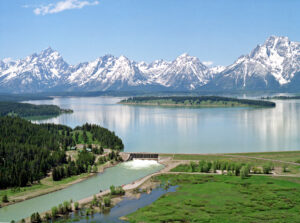Water was a pillar of economic success in the West long before Idaho and its neighbors became states. It has allowed us to boast of highly fertile farmland, thriving energy production, efficient transportation for goods, and unmatched recreational opportunities. As perhaps the most precious and vital resource in the western United States, our water comes with a storied past with competing interests. With its long history of controversy and compromise, those who best understand the complexity of the issues around water are the local communities. Western water is intricate and nuanced—and, above all else, so important to our state—which is why it is so vital that its management be focused in the individual states where laws and agreements have been shaped over time.
Idaho and other western states are no strangers to the burden of overreaching federal regulations. The egregious overstep by the U.S. Environmental Protection Agency (EPA) in 2015 to extend the waters of the United States definition far beyond what could conceivably be considered “navigable” has resonated throughout the state. To examine irrigation canals and ditches under the same lens as the Snake River and other western rivers shows the lack of awareness that can come when decision-makers are out of touch with the land and way of life they are dictating to. Federal bureaucrats who live on the banks of the Potomac should not be given unlimited authority to regulate states, which is unfortunately precisely what the 2015 rule accomplished.
In the United States Senate, I have worked to defend the states as equals to the federal government, especially when it comes to our sovereign right to manage our treasured natural resources. Idaho has its own definition of navigable that went through the public process in the Idaho State Legislature and became state law, taking into account the needs and intricacies of Idaho water. I applaud President Trump’s EPA for working to rescind the poorly crafted waters of the United States rule to give states their entitled authority.

This Congress and administration must continue our work to reduce regulations and remove bureaucratic barriers to make way for common-sense, locally driven solutions. This is why I have introduced legislation to revise the process for Bureau of Reclamation title transfers. More than two-thirds of Reclamation assets, such as dikes, ditches, and pumps, are maintained by nonfederal entities that cover operating costs and often have already completed capital repayment to Reclamation. Obtaining an asset’s title gives those local Home-Grown Solutions By United States Senator James Risch The Key to Successful Water Management in the West entities the autonomy and flexibility they need for better decision-making and financing opportunities. Although the process for transferring qualifying entities has been in place since 1995, only 30 assets have been successfully transferred across all Reclamation states. This is because along with meeting the framework required by Reclamation to be eligible, each individual title transfer requires full compliance with the National Environmental Policy Act (NEPA) and an act of Congress.
I am working to advance the Reclamation Title Transfer Act of 2018 to improve and hasten this process. Under this act, instead of requiring actions by both the House and Senate and full NEPA compliance, the title of qualifying entities will be able to be transferred by the secretary of the U.S. Department of the Interior with a 90-day window for congressional disapproval.
Idaho has been a success story in the current title transfer process, claiming 4 of the 30 successful title transfers. However, those individual transfers have taken as much as a decade and hundreds of thousands of dollars to accomplish. It is absurd to force local entities like irrigation districts to waste valuable resources just to be able to manage property in the exact way they already do. The convoluted process for a Reclamation title transfer should not be preventing the effective management of the West’s water resources. I will continue to work to get this legislation passed and signed into law so that irrigation districts are able to effectively manage their water.
I am confident that the best place for water-related and other decisions to be made is on the ground in Idaho because of our rich history of doing so. Disagreements over water rights and use are ever prevailing, but Idaho continues to be a shining example of how the best, most collaborative solutions come from those engaging with the land and the resources every day. Just look at the impressive work accomplished in such a short time in recharging the Eastern Snake Plain aquifer. Competing interests in a region where water is paramount came together and not only agreed to use less water but to actually pump it back into the aquifer. The result has been astounding. Annual recharge goals have been surpassed and water interests have chosen to pump more water into the aquifer than required by the agreement. This project will allow one of Idaho’s most important economic regions to remain viable long into the future and serves as an example for the rest of the country. This type of solution does not come from bureaucrats in Washington, DC, but rather from irrigators and canal companies that have both a stake in and an understanding of the aquifer.
Decades of not only serving Idaho and its agricultural industry, but being actively engaged in it, have shown me time and again that the best resource management comes at the local level. These success stories in water management should not be unique to Idaho; they should be burgeoning across the West. I will continue to fight for Idahoans and other water users to be able to make the decisions that will best use our nation’s most valued resources.
For more information, please contact Senator Risch’s office at risch.senate.gov.
